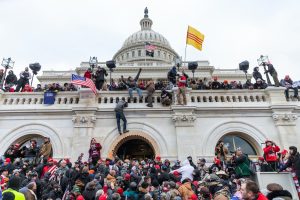BLOG: The January 6th Select Committee Is Ready to Share Its Important Work. We Must Tune In

Washington, DC – January 6, 2021: Protesters seen all over Capitol building where pro-Trump supporters riot and breached the Capitol
The Committee is now poised to pull back the curtain on the painstaking investigatory work conducted by its staff over the past year.
On the evening of June 9, in the first of a series of public hearings, the Committee will begin revealing information the public hasn’t yet seen. These hearings promise to shed new light on how the January 6 attack on our democracy was planned and financed, how it came to pass, and the people and organizations responsible—and to what degree—for helping make a planned insurrection a deadly event that nearly succeeded.
The parallelism here is palpable. Congress, the same institution against which former President Trump and a violent faction directed their wrath, will begin showing the results of its meticulous investigation on prime-time television, for all to see. No one who cares about the health and future of our nation can afford to miss it.
The need for repair is urgent—for the coming elections but also for the stability of our democracy as whole. While January 6, 2021, was 18 months ago, efforts to further undermine our democracy continue. As Republican-led state legislatures work overtime making it harder to vote, recent primary elections saw sedition-friendly Trump supporters win GOP nominations for a range of offices, including Pennsylvania governor, U.S. Senator from North Carolina, and “at least six state or local political candidates” who personally attended the so-called “Stop the Steal” rally on January 6. Meanwhile, Trump persists in lying to rally crowds about the legitimacy of the 2020 elections, and called on one candidate in an undecided race to simply “declare victory,” even as votes were being counted. And those who seek to undermine our democracy are peddling dangerous and extremely problematic legal theories, such as the Independent State Legislature doctrine, that would make it easier to undermine valid elections in the future. This is not solely about a particular candidate or a single election—it is about an existential threat to American democracy.
The bipartisan Select Committee members and staff understand that January 6 wasn’t an offense against a building. Rather, the violence of that day was a frontal assault on the American people. It was an attack on all who care about the laws of our country—especially our Constitution. That is why the Committee’s work is critically important. As the Committee’s Republican vice-chair, Rep. Liz Cheney has said, “I think what we have seen is a massive and well-organized and well-planned effort that used multiple tools to try and overturn an election.”
That’s exactly right. It was a violent attempt to stop the peaceful transition of presidential power, an effort to keep Trump in the White House despite the fact that the American voters had spoken at the ballot box. Rather than respect the will of the people, Trump and his allies displayed little respect for democracy, engaging in actions that one might more readily expect from authoritarian leaders such as Putin in Russia, Orban in Hungary, or Xi in China.
That is intolerable in the United States of America. The despicable acts of January 6 must be laid out for all to see, and their perpetrators identified and held to account—not just those who physically breached the Capitol, but also all those who directed and helped plan to overturn the 2020 presidential election, which evidence suggests was the entire goal of that attack. On June 9, the Select Committee will begin to show the immense amount of work it has done. And everyone who cares about our nation should tune in.
